Is CNN Part of the Truth Problem in the Media?
Subscribe Today!
Fake news, clickbait, and irresponsible journalism have been common problems in media that have now injected themselves into the norm. When it comes down to who is responsible, it can only fall on the hands of media outlets whose job is writing and disseminating the news. In this episode, Bill Stierle and Tom dive deep and share their thoughts on how major news outlets are doing their job in portraying the truth and its impact on citizens, especially voters. They highlight Jim Acosta's question to former President Donald Trump and discuss how language and wording affect how news is reported and received.
---
Watch the episode here
I'm pleased to talk about this subject. This may surprise some of our regular readers. A lot of times, we'll call out Fox News, Sean Hannity or Tucker Carlson on something they're saying that's not in alignment with truth or not helpful but we're going to talk about CNN and how they're a part of the problem, too.
As I support businesses and organizations to communicate better, one of the challenges is that if you put junky language into it, you're not necessarily going to get cooperation and collaboration from the listener. They're going to literally reject and/or boo when you're using a language strategy that isn't helpful. Having the opportunity to say, “We've got to do a better job of communicating to make a difference, not to create a conflict.” That's one of the things that regrettably, a paid news service that's looking for advertisement is looking forward to creating a conflict so they can get eyeballs so that they can pay the bills, stay in business. All of a sudden, you're not getting the level of news that we would like to get and it's not reported that way. It's reported from a place of escalated energy to get the number of eyeballs it needs. That's one of the big problems that CNN and all the news outlets have. They've got to maintain some form of sensationalism in order to keep their eyeballs in place. Regrettably, it's caused some junky tactics to take place.
When I see some of these tactics and actions, it's very disheartening and disappointing to me. I'm not going to paint the entire news organization with the same broad brush. I don't know if it's the producers telling the reporter to do this or the reporter deciding to do it on their own but it appears like they're trying to manufacture news. Manufacturer something that's going to be controversial to get those eyeballs.
If I'm a news producer or a news executive that has been in charge of making sure I am maintaining market share, I got to figure out how to penetrate this now broad landscape of information exchange. I've got to get the viral thing to show up. If I'm not getting X number of people watching this broadcast, what winds up happening is that I can't stay in business because all of a sudden, I'm out in the outer part of the solar system hanging out with the asteroids and there's no warmth out here or no cash either. I've got to create something that's going to create a controversy and/or create an emotional response inside the group that I'm with. Before we got on, you showed me a little clip. If you'd be willing to set that up a little bit, where was that clip taken?
The clip with Jim Acosta from CNN. He traveled with the press corps and former President Donald Trump in Texas down to the border of Mexico. He goes to Texas because I also saw some footage of Governor Greg Abbott of Texas seeing him as well. The former president was playing his greatest hits and he was continuing to propagate the big lie. Interestingly, the other people that were there, the audience for Donald Trump's speech, were not Donald Trump supporters. It was members of Congress, especially the House of Representatives, who are in alignment with him. Jim Acosta, when there was a lull toward the end of his speech and what he was saying, decides to shout a question at the former president and asked, “Are you going to apologize for January 6th?” To me, it was very disappointing to see him ask that question in that way but even to ask it at all. There's no way Donald Trump's going to agree with you on, you know what his answer's going to be. You're just trying to make the question itself be the news.
That’s the thing that's missing here, the power of communication. If you're confronted with a challenging question, it's to step through the challenging question, not to step around it. One of the things that have happened many years ago is to do a thing called sidestep the challenging question rather than step through. The challenging question. It’s what I recommend when I do my mediation practice when I do business consulting. Step through the conflict. Don't step around it, bring bad news early, do scary honesty, take the heat, hold the shield up if they're doing a flame thrower and have a compassionate and empathetic response to get back. Apologies rob us of that. Apologies always have power over narrative. Somebody is better than the person that made the mistake.
One of the things that we need to do as human beings is do a better job regarding accountability. You and I know this one. Down the thing, it's not just global warming but it's global pollution to go with the global warming which is having to do with, “I can make this plastic thing but I'm not responsible for nature to reprocess it, it's up to some landfill to do it.” That's a level of balance of nature that we need to get ourselves into because all of a sudden, I feel like I'm coming out of a scene of Wall-E where all the trash is piled up all over the place on the planet. There's a lot of robots putting the trash into the little containers in a stack. Is that the world that we're heading towards? We want to do a better job of languaging and being able to give a question to a leader that they can answer and slow walk into accountability which is something that most people are willing to do, so it's not dangerous and can.
It can help reveal the truth of the person that you're asking a question of without them realizing that you're walking them out the end of a plank. I agree that former President Donald Trump could have answered that question in a way that he could have turned it into a win for him. Wouldn't he love that? I heard he likes to win but he doesn't think that way. He feels like, “You punch me. I'm going to punch you back.” That's his style. Let's say you're Jim Acosta in that situation. For a moment, let's change the circumstance a little bit and say he's not yelling a question in a situation that you're unlikely to get an answer on here, let's say he's been called upon and he's going to ask a question and the former president's paying attention. What would you counsel Jim Acosta to do to restructure that question to start to achieve something beyond getting attention?
The difficulty that's a part of it is that Jim Acosta just needs the emotional reaction because the story was a part around the insurrection but it was really about the way it was framed inside that video clip. These were all the congressmen that avoided voting on the thing.
We need to make sure that our audience understands that.
It is an alternative motive for Jim Acosta doing it. He's trying to shine the light on another truth by creating an inciting incident. It's not flashy enough for the internet, unless you say, “The crowd boos Jim Acosta.” That would be a great highlight. What did Jim Acosta say? Jim Acosta’s doing is the same thing as Tucker Carlson’s doing and the same thing as Donald Trump does.
He was manufacturing news, trying to create some new truth. Let's be clear for our audience, so they understand. This speech at the border took place the same day there was a vote in the US House of Representatives, specifically for creating a house select committee to investigate January 6th. Since the bipartisan effort got killed in the Senate, the House decided they're going to move forward and investigate on their own. All these Republican members of the House avoided voting on it at all. They didn't vote yes or no because they're at the border with Donald Trump.
They don’t have to go on record one way or another. “I wasn't there for that vote.”
“I was dealing with urgent matters that are border,” or I was something.
Our words matter, how integrity works matters. Human beings want trust, integrity and truth-telling. It can’t do but at the same time, a person or a group of people, it's too painful for them to listen to the truth because it's against a fundamental belief that they've invested in. People have invested in the former president. Money, time, energy, spirit, prayers, all of those things they've invested in the former president. It’s because they've invested in, they believe in him. He's able to do it. The messaging is, “Nobody can fix this but me.” It doesn't matter if he did or didn't fix things because the brain needs to believe 51% of it to be true. It needs to be over the middle mark before it says, “I'm all in.” I know that's unsettling but the brain is willing to tolerate 49% of untruth just to create stability for itself. I'm wincing because that means that it's easy to sell soap, razors, food, fast food and whatever stimulus that you put it. It means, “We are not fast food, we are fan food.” All of a sudden, I language a marketing slogan for one of the fast-food restaurants.
People love our food. It doesn't matter that they're taking you away from what it is or if it’s healthy.
We can go down various different marketing and branding messages and it's where the vote is, whether it's the vote or the cash, all I got to do is get that brain to be on the 51% tile side of it and keep reinforcing the 51% that it's true. The brain will naturally move over and it's hard to swing back. It's almost like it's a sad story. The researchers documented this pretty good. That at the end of World War II, as the German soldiers came home, many of them believe that Adolf Hitler never lied to them. You got to sit with that a little bit because that means there was loyalty, respect and the fight for the motherland and fatherland in this case. The commitment to loyalty into an identity and to the vision of the leader. It's also to the product. You and I buy things based on how many imprinted messages that we've received and our brain can't escape it either. It's important for us as human beings to start writing our language that has things that can be helpful.
Jim Acosta would say instead of, “Are you apologizing?” No. Donald Trump will never answer that question. It's going to get Jim Acosta the eyeballs he wants but it's not necessarily going to help the nation. It’s like, “Is this event helping the nation heal?” He still gets his headline because everyone at the press corps is going to still boo him. Now, it's not about an apology, it's about a forward leading message. People will boo him. “Is this helping the nation heal?” Can you imagine that sentence instead of apologizing? Apologize, in this case is a pass-looking narrative and this is a future-looking narrative based on a need that is valuable to the nation. That helps news because now the conversation is, “He's not interested in healing in the nation.” Also, all the congressmen that are here are not interested in healing in truth for the nation, either.
All of a sudden, he still has the message but there are people who say, “Donald Trump doesn’t have to apologize for anything. He didn't send those people down there. Those are just crazy people.” The people that are saying that are already on the 51% in the believability of it. This is a very unsettling conversation about how language can be used and if we don't do a better job, fake news gets to have more of a lifespan than it already has, which is not good to have because they're telling a story to get eyeballs. Our nation is not in the willingness to take capitalism away from the news.
The news organizations are independent and they have to make a profit or they're not going to be around. That is true and that's problematic in its own way but it's the reality of our capitalistic society.
There are ways to get there, language-wise, at least your closer to integrity and truth. It's not so much Jim Acosta’s fault as much as an unawareness of the problem in it. The problem in it is you're trying to create a power under narrative, which is the same thing that the right does the left does.
That’s what Tucker Carlson does on a daily basis on his show.
He's doing that. Marketing and branding become the primary focus and all you're doing as news media outlets are testing, branding and marketing message to see what else sticks in order to persuade, encourage, capture and list loyalty against the other side. That's not a strong, healthy democracy narrative. I'll give you an opinion but setting an opinion next to an exaggerate and spin as one Fox person said, “He exaggerates and spins, he doesn't lie.” Exaggerates means that you're telling something below 51% and you're spinning it to get it to be above the 51%. That's the way language is being used. We're going to see more blaming, shaming, judgments, criticisms, labels, diagnoses. Both as a nation, a business, a company or as an individual, if we're going to work to reduce the emotional load inside the listener and to have a better discussion of truth, then we can do a better job of getting progress to work on the things we need to work on. We've got some big problems.
We do have some big problems and that was our point from the beginning of this episode. Do we need to waste time getting eyeballs to a story instead of trying to report some news, find some facts or ask some questions that can be answered, that get us closer to the truth? It's disappointing when that doesn't happen.
Saturation branding and saturation marketing work. You say it enough and it works. That's why a lot of Republican voters believe that there are problems with the election. They believe it because they keep hearing the same message. They've got them from the 40% part of the brain believing it up over the 51% and once you keep getting them on the other side of the line, you've got this heard going in the direction that is not inclusive and collaborative.
That's the other problem that we've seen Jim Acosta do in other reporting that he's done. Some of the other, we talked about another CNN reporter about how they go after the fact and they try to combat these 51% and more beliefs with the facts which are never going to work. It's not effective.
You've got to be compassionate to what the person's response is, not counter with a point-counterpoint with a fact that's not helpful. What's helpful is that the person is in a group of people and says, “The voters are in charge.” These voters are not really in charge because they're not on the Supreme Court. The court has the wisdom, knowledge and experience about the Rule of Law. The voter is not enforcing the Rule of Law. In fact, if you left it up to them, they would want somebody to enforce the law on others but not themselves.
That's when a lot of current spinoff problems that we're having right now with various different laws that are being written in order to support the needs of the few over the needs of the many. That's not a good thing. It becomes less and less a stable entity called the nation. We got to recapture that and do a better job recapturing that because restoring respect, identity, acknowledgment and recognition for what the nation does and can do is called honoring the win when it takes place. We'll have to see how the infrastructure bill will sit as it moves forward.
Thanks, Bill Stierle. I appreciate having this conversation and shining a little light on what is some sensational journalism.
Get beyond apologies, get into disappointments and how to transform an apology moment into a moment of healing, progress, and growth. An apology doesn't fully get us there. That's what we pick up with, next is how do we move the needle to get our leaders to language things in a way that it's going to move forward. That'll be more helpful.
Bill Stierle, thanks so much. I look forward to that.
Thanks, everybody.
Important Links:
Love the show? Subscribe, rate, review, and share!








